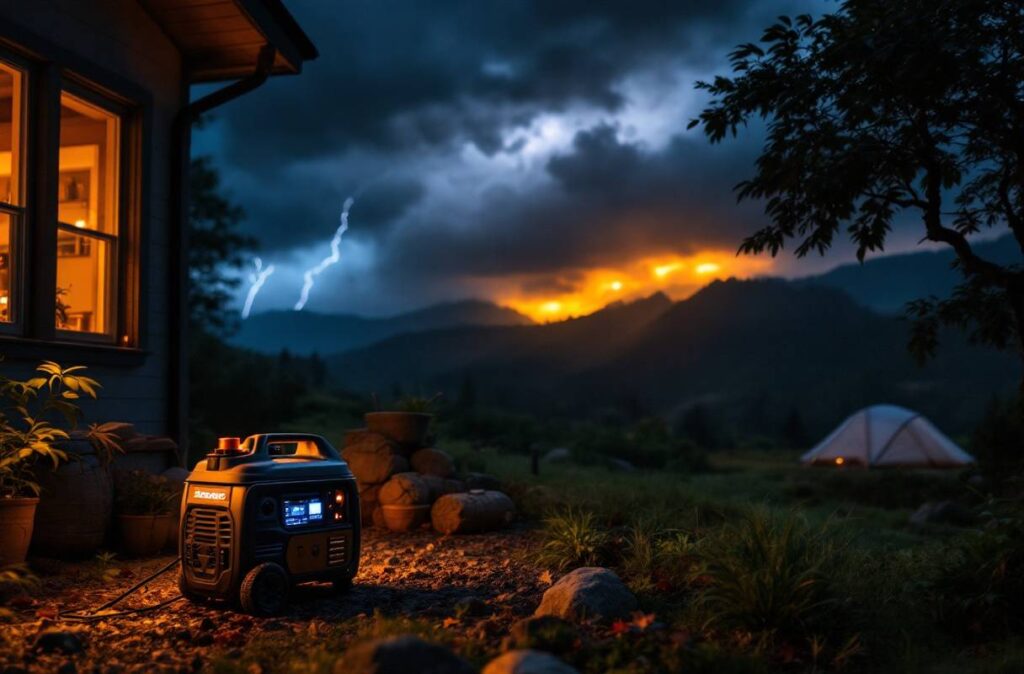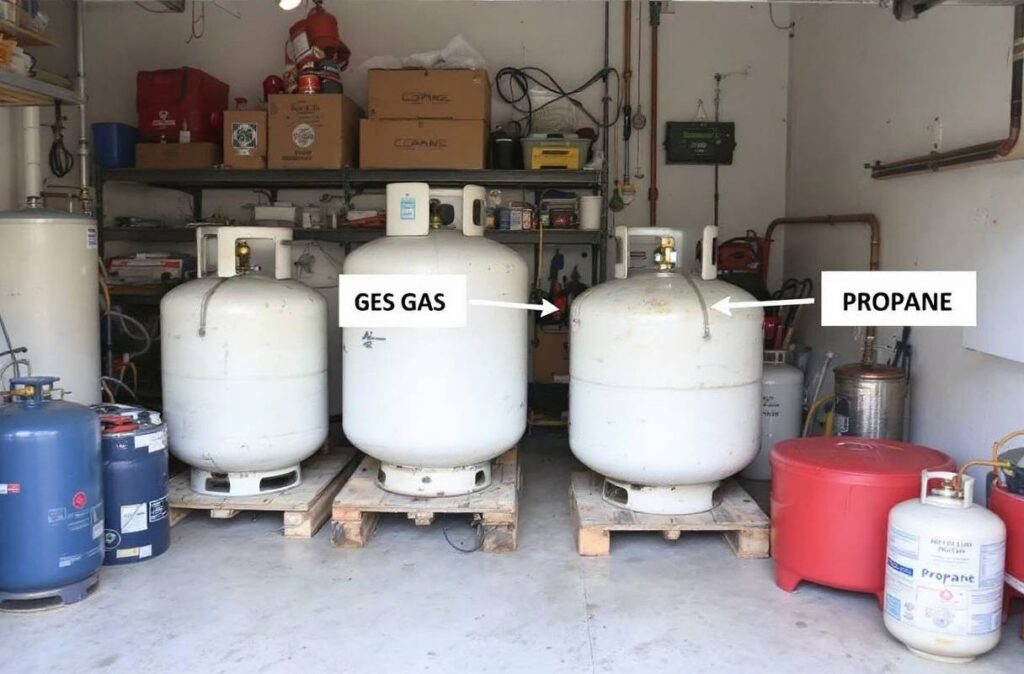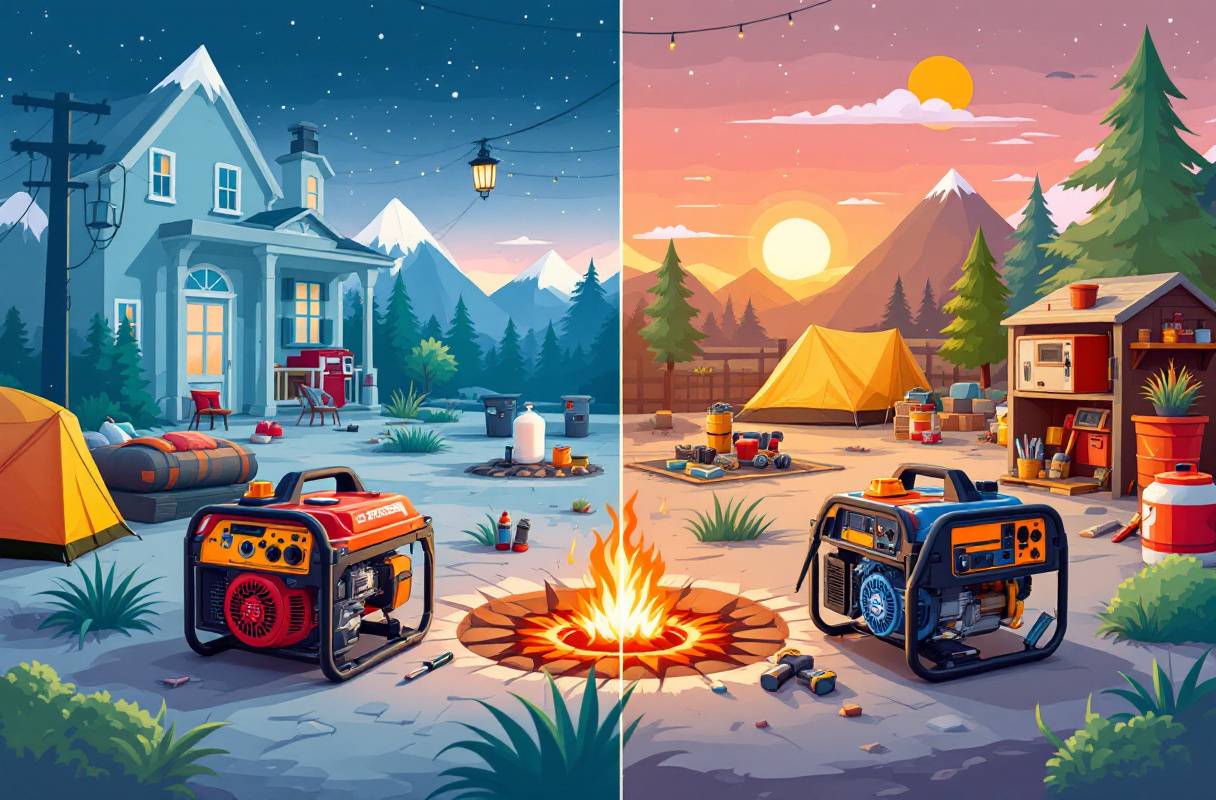When the unexpected strikes—whether a storm knocks out your power or you’re deep in the wilderness without electricity—portable generators become your lifeline.
But with options like gas and propane generators available, choosing the right one can be daunting.
Imagine having the perfect power partner that not only meets your energy needs but also aligns with your lifestyle and environmental values.
Dive into our comprehensive guide to uncover the strengths and weaknesses of gas versus propane portable generators, ensuring you stay powered up no matter where life takes you.
Power Up on the Go with Portable Generators
So, here’s the scoop: portable generators are like your trusty sidekick in the world of power gadgets. They’re not just a luxury—they’re an absolute must-have when the lights go out or when you’re cooking breakfast in the middle of nowhere. These compact energy machines bring ease and assurance just when you need them most.
Why Portable Generators Are Your Best Buddy

These nifty devices come through shining in a bunch of situations. When the power goes out, homeowners depend on them to keep the fridge humming and the lights on. They’re like a superhero cape for your house during a storm or when the grid takes an unplanned nap. If you’re trying to sort out which one fits your home like a glove, our piece on best portable generators for home backup is there for you.
For the outdoor crowd and the tent-pitchers, portable generators are gold. They let you whip up a hot meal, keep your devices alive, and light up your camp while still soaking in those starry nights. Trust me, some of those best portable generators for camping do the job without harshing your mellow.
RV fans? Oh, they love these things! You can pump up the AC, run your micro, or binge-watch a marathon of shows while parked in the middle of nowhere. If silence is golden, our guide on quiet portable generators for RV might just be the treasure you need.
Got a project in the boonies? Construction folks and DIY weekends can’t always count on the magic of wall sockets. Portable generators have your back, letting you power up your drills and saws without being tied to a plug.
Throwing a party or flipping burgers on wheels? Event hosts and food truck maestros need juice for the sound and the sizzle. These generators make sure the music’s loud and the fries are crispy, no sweat.
Developments in the generator world mean you’ve got loads of choices, from tiny but mighty to big and brawny. Curious about what size suits you? Hit up our guide for choosing portable generator size. And for the tech-savvy crowd interested in quieter, smarter machines, check out our take on inverter vs conventional portable generators.
| Portable Generator Use | Typical Power Requirement (Watts) |
|---|---|
| Home Backup | 5000 – 7000 |
| Camping | 1000 – 3000 |
| RV Use | 3000 – 4000 |
| Construction Sites | 4000 – 7500 |
| Events and Food Trucks | 3000 – 6000 |
No matter what you’re up to, portable generators bring the power game strong. Just be sure to play it safe and keep your gadget in tip-top shape—our portable generator safety tips and maintenance guide got you sorted.
Gas vs. Propane Portable Generators: An Overview
Picking between gas and propane portable generators can feel like choosing between your favorite snacks—they each have their own flavor and benefits. You gotta know the scoop to keep the lights on (literally).
Comparison of Gas and Propane as Fuel Sources
Both gasoline and propane play starring roles in powering portable generators. They each bring their unique stuff to the party:
| Feature | Gasoline | Propane |
|---|---|---|
| Energy Efficiency | Packs more punch per drop | Needs more fuel for same power |
| Cost | Like a rollercoaster ride | Prices are more like Sunday drives |
| Storage | Goes bad quick, needs meds | Sticks around like an old friend |
| Availability | Just a gas station away | A dedicated gig, with some effort |
| Emissions | Puffing smokes like Uncle Joe’s old truck | Breezy clean, not so much smoke |
Gasoline is the heavyweight champ in the energy department—plenty of power for the gallon. Downside? It’s like that friend who never stays put for long—needs stabilizers to hang around. Propane might not have the power-per-pound, but it’s way cleaner and keeps for an age.
Factors to Consider When Choosing Between Gas and Propane
So, what’s the buzz when choosing? Let’s break it down by what matters most:
Cost and Availability: Gasoline’s price is as unpredictable as a cat, but you can grab some almost anywhere—thanks, gas stations! Propane? It’s the homebody of fuels, needing its own crew of suppliers and a smidge more effort to find.
Environmental Impact: Mother Nature would give you a thumbs up with propane—lower emissions mean less junk in the air.
Storage and Shelf Life: Gasoline likes the drama—store it wrong, and it’s gone stale faster. It’s a hassle for long-term needs. Propane tanks? They’re the reliable ones you want around for long hauls.
Performance and Efficiency: If it’s pure power you’re after, gasoline’s your beast. Gas engines sip less fuel for the same juice. Propane’s slightly on the quieter side in power output but scores with clean energy and longevity.
For a deeper dive into picking the perfect generator that fits your needs like a glove, check out our article on best portable generators. Look into the little things that swing decisions one way or the other.
Understanding these points will help you figure out which fuel is the hero in your generator adventure, making sure you’ve got juice when you need it most. Check our portable generator maintenance guide and storing portable generator for tips on keeping your generator in tip-top shape!
Gas Generators Explained
Knowing how gas generators crank out power and their ups and downs can steer you in the right direction when picking a portable generator that’s just right for you.
How Gas Generators Operate
Gas generators are like little energy transformers—taking gasoline and turning it into the electricity you need. Here’s the rundown on how they do their thing:
- Fuel Intake: Gasoline hangs out in the tank until it’s needed, then it’s pulled into the engine.
- Combustion: Inside the engine, gas and air come together, and a spark gets them going in the combustion chamber.
- Mechanical Energy: That fiery mix creates pressure, pushing pistons and generating mechanical energy.
- Electricity Generation: This energy spins the rotor in the generator, creating a magnetic field, which morphs into electrical juice.
- Power Output: Finally, that electricity heads out to power your gadgets, tools, or whatever else you hook up.
Pros and Cons of Gas Generators
Gas generators are awesome but not flawless. Here’s a peek to help you choose.
Pros:
- High Power Output: Need a lot of juice? Gas generators usually deliver more power compared to other types.
- Fuel Availability: You can find gas almost everywhere, making it super convenient to refuel.
- Cost-Effective: Buying one typically won’t break the bank, costing less upfront than some other kinds.
- Portability: Small and handy, these generators are great for campers, outdoor festivals, and backyard parties.
Cons:
- Fuel Volatility: Gas is pretty explosive, so handle and store carefully.
- Maintenance: Keeping them running smoothly takes work: oil changes, fuel additives, and a clean air filter. Check our maintenance tips.
- Emissions: Burning gas isn’t the best for Mother Earth with all those pollutants.
- Fuel Stability: Gas can go bad without additives, messing with your generator’s mojo.
- Noise Level: They can be loud, which might not always be welcome. Peek at our guide on quieting things down.
| Feature | Gas Generators |
|---|---|
| Power Output | High |
| Fuel Availability | Everywhere |
| Initial Cost | Friendly on the wallet |
| Portability | Super Handy |
| Fuel Stability | Needs stabilizers |
| Emissions | Not so eco-friendly |
| Noise Level | Can be loud |
Getting a handle on how gas generators work and what they bring, both good and bad, can help you figure if this is your go-to gadget. For a closer look at how they stack up against others, dive into our portable generators guide.
Propane Generators Unplugged
When you’re on the hunt for a way to keep the lights on during a camping trip or a power outage, propane generators are a solid contender. They’ve got their perks and downsides, so let’s break it down so you can decide if they’re your jam.
How Propane Generators Work
Propane generators might sound complicated, but they’re really not rocket science. They basically turn propane into electricity. Here’s the scoop: Propane flows from a tank into the generator’s engine via a fuel line. Once inside, a carburetor mixes it with air to whip up something that’s ready to burn. A spark plug then lights this mix up, causing a little bang that moves a piston. This piston movement creates mechanical energy, which then gets turned into electrical energy by an alternator. Fancy, huh?
These generators are usually equipped with an auto fuel shutoff valve for peace of mind. Plus, they come with a control panel to keep tabs on power and performance.
Propane Generator Steps:
- Gas Supply: Propane makes its way from the tank into the engine.
- Mixing Magic: The carburetor does its job, combining propane with air.
- Lighting Up: A spark plug gets the mix burning.
- Power Conversion: The piston gets to work, turning mechanical energy into juice via an alternator.
Pros and Cons of Propane Generators
Propane generators are handy for sure, but they’ve got their own set of quirks. Here’s a quick run-through of the good, the bad, and the just plain awkward.
| Pros | Cons |
|---|---|
| Cleaner Burn: Kicks out fewer emissions than their gasoline pals. | Fuel Find: Some places don’t have it on every corner. |
| Keeps Fresh: Propane doesn’t go bad – great for stockpiling. | Cold Weather Woes: Not a fan of freezing temps. |
| Low Noise: Won’t wake the neighborhood. | Pricey Start: They can dent your wallet upfront. |
| Easy on Spills: Less spill risk than gas, easier to stash. | Space Hog: Those tanks need a spot in the garage. |
| Eco Points: Smaller footprint for the eco-conscious. | Tank Swap Hassles: Changing tanks might test your patience. |
Weighing these pros and cons gives you the lowdown to pick what suits your power need best. From weekend warriors to prepper enthusiasts, propane generators deliver the goods. If you’re still on the fence, swing by our reads on top portable generators and home backup champs. Whether it’s for home sweet home or the great outdoors, get clued up on what propane generators bring to the table and you’ll thank yourself later.
Fuel Availability and Storage

Choosing between gasoline and propane portable generators can feel like picking a favorite kid, especially when fuel availability and storage stand front and center. Cracking this nut helps homeowners, campers, road trippers, builders, and event organizers make savvy choices.
Availability of Gas and Propane
Fuel availability is where the rubber meets the road. Let’s break down how easy it is to snag gas or propane for your trusty generator sidekick.
| Fuel Source | Availability |
|---|---|
| Gasoline | Easy peasy to find at gas stations, convenience stores, and even some hardware joints. |
| Propane | You’ll snag it at gas stations, home fix-it stores, and propane stops. But good luck finding it in the sticks. |
Gasoline floods the market—one swipe of the debit card at nearly every gas station, and you’re golden. It’s the go-to choice when you’re winging it without fancy fuel spots around.
Propane’s no slouch, but it’s a tad shy compared to gas. You can grab it at gas stations, home centers, and special propane spots, and many RV parks and campgrounds might fill you up right then and there. If you’re RV-ing or camping, buddy, propane could be your trusty sidekick.
Storage Considerations for Gas and Propane
Fuel storage is like having a quirky neighbor—tricky but essential. Gas and propane have unique needs, which switch up their practicality.
Gasoline Storage
Store gasoline like you’d handle a porcupine—cautiously. Use only approved containers, make sure it’s away from heat, and keep things breezy. Remember, it ages like a banana. Add stabilizers, and you’ve got about a year to use it up.
| Storage Factor | Gasoline |
|---|---|
| Shelf Life | Up to a year, if you promise to add stabilizers. |
| Storage Container | Only legit gas containers, no cut corners. |
| Storage Location | Made in the shade—cool, dry, and breezy, far from heat fiends. |
For more on making your generator and fuel play nice, peek at our guide on storing portable generator.
Propane Storage
Propane plays the long game with storage, keeping its cool permanently. It just needs to chill in approved containers and breathe a bit, away from temperature dramas and fiery stuff.
| Storage Factor | Propane |
|---|---|
| Shelf Life | Eternity—propane could outlast Dracula. |
| Storage Container | Gotta be certified propane cylinders—complain-proof ones. |
| Storage Location | Outdoor spaces that like fresh air, far from oven-hot or flame-y places. |
Thanks to its always-ready status, propane’s your ace in the hole for doomsday prepping or when life throws you curveballs.
For insights on picking the perfect generator size, dive into our piece on choosing portable generator size. Plus, arm yourself with smarts from our portable generator safety tips.
Lining up gas or propane’s perks and quirks can help you pick the portable generator that fits like a glove.
Environmental Impact
When you’re standing there scratching your head over whether gas or propane is the better choice for your portable generator, it’s all about which one keeps Mother Nature happy. Let’s dive into the good, the bad, and the fugly of each option.
Environmental Benefits and Concerns of Gas
Gasoline is like the go-to Sunday BBQ invitation—always there but maybe not the best for your heart (or the environment). Here’s the scoop on using gas in your generator:
Upsides of Gas:
- Grab-and-Go Fuel: You can easily swing by almost any gas station and fill ‘er up, making it convenient when you need power ASAP.
- Juice in a Can: Gas packs a punch, offering lots of energy that can keep your gadgets humming.
Downsides of Gas:
- Pollution Party: Burning gas throws a cocktail of greenhouse gases into the air, like carbon dioxide, which isn’t doing the ozone layer any favors.
- Messy Mischief: Spills and leaks are like that unwanted guest—they destroy your good time and potentially mess up the ground and waterways.
| Environmental Factor | Gasoline Situation |
|---|---|
| Greenhouse Gas Emissions | Sky-High |
| Pollution Chance | Major |
| What’s in the Tank | Always Handy |
Environmental Benefits and Concerns of Propane
Skip the pump and go propane if you’re looking to clean up your act just a smidge and sport that eco-smile.
Pros of Propane:
- Less Stink, More Sweet: Burns cleaner, so you can breathe easier knowing there’s less bad stuff floating around like CO2 and carbon monoxide.
- No Mess Monday: Those secure tanks aim to keep your stuff where it belongs, inside, not all over the place.
Cons of Propane:
- Smog-Start: Making propane isn’t guilt-free; wrangling it produces some gases, though fewer than gasoline.
- Bulky Baggage: Propane tanks can add some heft to your move, feeling like you’re carting around a portable BBQ without the hotdogs.
| Environmental Factor | Propane Situation |
|---|---|
| Greenhouse Gas Emissions | Just So-So |
| Pollution Chance | Safe Bet |
| What’s in the Tank | Sometimes Handy |
Hungry for more? Check out options like quiet portable generators for RV or even best dual fuel portable generators for more ways to keep your green streak going. And don’t forget, following portable generator safety tips can help you leave a lighter footprint on this rock we live on.
Maintenance and Durability
When you’re eyeing portable generators, keeping them tickin’ like a charm means remembering their maintenance and durability needs. Here, we break down what it takes to keep both gas and propane generators in top shape.
Maintenance Requirements for Gas Generators
For gas generators to hum along happily, they need some TLC. Here’s what to put on your to-do list:
- Oil Changes: The oil’s the lifeblood of the engine, so change it up often.
- Air Filter Swaps: Don’t let a clogged air filter choke your engine; change it regularly.
- Spark Plug Check-Up: Make sure these tiny powerhouses are clean and good to go.
- Fuel System TLC: Prevent clogs by cleaning the system and using fuel stabilizers.
| Maintenance Task | Frequency |
|---|---|
| Oil Change | Every 50-100 hours |
| Air Filter Replacement | Every 25-50 hours |
| Spark Plug Inspection | Every 100 hours |
| Fuel System Maintenance | Quarterly |
For all the nitty-gritty details on gas generator upkeep, check out our portable generator maintenance guide.
Maintenance Requirements for Propane Generators
Propane generators are the less needy relatives—low maintenance, but not no maintenance. Here’s their checklist:
- Oil Changes: Stick to the schedule to keep things purring.
- Air Filter Swaps: A clean air filter is your engine’s best friend.
- Spark Plug Check-Up: Regular checks keep performance on point.
- Fuel System Maintenance: Propane’s no spillage character means less fuss here.
| Maintenance Task | Frequency |
|---|---|
| Oil Change | Every 100-150 hours |
| Air Filter Replacement | Every 50-75 hours |
| Spark Plug Inspection | Every 150 hours |
| Fuel System Maintenance | Biannually |
With propane, you dodge the fuel degradation headache, making life that little bit easier. Get the scoop on taking care of propane generators in our portable generator maintenance guide.
Getting the maintenance of both gas and propane generators right helps you catch the best bang for your buck. Weighing gas vs propane portable generators just got simpler. Stick to the upkeep schedules to boost the lifespan and reliability of your portable pal. For more advice on keeping things safe, dive into our portable generator safety tips.
Choosing the Right Portable Generator for Your Needs
When picking a portable generator, whether gas or propane, there are a few things to chew over to snag the best fit for your needs. This part breaks down some big-ticket items, helping align your power cravings with the perfect gizmo.
Factors to Consider Before Making a Decision
- Power Output Requirements: Figure out how much juice you need. Try our portable generator wattage calculator to eyeball the watts your gadgets and gizmos will slurp up.
- Fuel Efficiency and Runtime: Check out how much gas or propane the generator gulps and how long it’ll hum on a tank. Gas guzzlers generally keep going longer, but propane plays it cool in the fuel-sippin’ department.
- Portability and Weight: Whether you’re running a home base, pitching a tent, or hitting the road, think about how much this thing weighs and how easy it is to lug around. For campers, peek at best portable generators for camping.
- Noise Level: Some machines purr, others growl. Tired of the roaring? Swing by our piece on quiet portable generators for RV.
- Ease of Refueling: Propane bottles are a breeze to store and pack away compared to jerry cans of gas, though gas stations are all over the place. Our guide on fuel availability and storage tells you more.
- Starting Mechanism: Those electric-start models sure make life easier but can cost a pretty penny. Pulling the cord is what you’ll find on most models, both gas and propane.
- Environmental Impact: Propane’s a greener choice, puffing out fewer nasties. Check out our environmental impact write-up.
Matching Your Power Needs to the Best Generator Option
Different strokes for different folks, right? Here’s a quick cheat sheet on who should grab what kind of generator:
| Scenario | Recommended Generator Type | Reason |
|---|---|---|
| Home Backup | Gas Generator | Beefier power, runs longer |
| Camping | Propane Generator | Clean-burning, easy-peasy storage |
| RV Use | Quiet Gas Generator | Fuel’s accessible, plays nice with RV gadgets |
| Construction Sites | Gas Generator | Packs a punch, runs ‘round the clock |
| Events & Tailgating | Dual-Fuel Generator | Flip between gas and propane hassle-free |
Hungry for more deets and tips? Sniff around our articles on best portable generators under $500 and best dual-fuel portable generators. Our section on portable generator maintenance guide has all the tricks to keep your machine in ship-shape.
Bagging the right portable generator means trusty power when the lights go out. Mull over these pointers and match up with your power needs to score the right choice. For more scoop and purchase pointers, check out our resources on connecting portable generators to your house and essential portable generator accessories.
Conclusion
Choosing between gas and propane portable generators ultimately hinges on your specific power needs, lifestyle, and environmental considerations. Gas generators stand out for their robust power output and ease of refueling, making them ideal for home backup and heavy-duty tasks.
However, they come with higher maintenance requirements and greater environmental impact. On the other hand, propane generators offer cleaner energy, longer fuel shelf life, and lower emissions, making them perfect for eco-conscious users and outdoor enthusiasts who prioritize sustainability and ease of storage.
By understanding the unique advantages and limitations of each fuel type, you can make an informed decision that aligns with both your practical needs and personal values. Whether you’re safeguarding your home against power outages, enhancing your camping adventures, or powering up construction projects, the right generator can make all the difference.
Remember to consider factors such as fuel availability, storage requirements, and maintenance routines to ensure your generator remains reliable and efficient for years to come. Empower yourself with the knowledge to select the perfect portable generator, and enjoy uninterrupted power wherever life takes you.
Final Thoughts
Selecting the right portable generator is more than just choosing between gas and propane; it’s about understanding how each option fits into your unique lifestyle and power requirements. Gas generators excel in delivering high power and convenience, making them ideal for robust applications like home backups and construction sites.
Conversely, propane generators shine with their cleaner emissions and longer fuel storage capabilities, catering to environmentally conscious users and outdoor enthusiasts who value sustainability and low maintenance. As technology advances, the lines between these options continue to blur, offering more efficient and versatile solutions to meet diverse needs.
By thoroughly evaluating factors such as fuel availability, environmental impact, maintenance demands, and specific power requirements, you can make a well-informed decision that ensures reliable and efficient power supply whenever and wherever you need it. Embrace the power of knowledge, and let the right generator empower your adventures and safeguard your home with confidence.
Main Tips
- Assess Your Power Needs: Determine the total wattage required for your essential devices and appliances to choose a generator with adequate power output.
- Consider Fuel Availability: Opt for a generator that uses readily available fuel sources in your area to ensure easy refueling when needed.
- Prioritize Environmental Impact: If eco-friendliness is important to you, propane generators are a cleaner alternative with lower emissions.
- Evaluate Portability: Choose a generator that is lightweight and easy to transport, especially if you plan to use it for camping or RV trips.
- Regular Maintenance: Keep your generator in top condition by following a regular maintenance schedule, including oil changes and filter replacements.
FAQs
What are the main differences between gas and propane generators?
Gas generators offer higher energy efficiency and are widely available, while propane generators are cleaner-burning with a longer fuel shelf life.
Which generator type is better for the environment?
Propane generators are more eco-friendly as they produce fewer emissions compared to gas generators.
How often do gas generators need maintenance?
Gas generators require more frequent maintenance, including regular oil changes, air filter replacements, and spark plug inspections.
Can propane generators be used in cold weather?
Propane generators can struggle in freezing temperatures, so they may not be the best choice for extremely cold environments.
Which generator is more cost-effective in the long run?
While gas generators are generally cheaper upfront, propane generators can be more cost-effective over time due to lower maintenance and longer fuel shelf life.
Recommended Products and Accessories
- Champion 4500-Watt DH Series Open Frame Portable Generator
- Description: Reliable gas generator with high power output, perfect for home backup and heavy-duty use.
- Westinghouse WGen7500 Portable Generator
- Description: Dual-fuel generator offering flexibility with both gas and propane, ideal for various applications.
- Generac GP2200i Portable Inverter Generator
- Description: Compact and quiet propane generator, perfect for camping and RV use with clean energy output.
- Champion Portable Generator Cover
- Description: Durable cover to protect your generator from the elements and extend its lifespan.
- Bluetti AC50S Portable Power Station
- Description: Eco-friendly accessory offering additional power storage and versatility for your generator setup.
- Portable Generator Transfer Switch Kit
- Description: Essential for safely connecting your generator to your home’s electrical system.
- Propane Tank Holder and Stand
- Description: Secure and convenient storage solution for your propane tanks, ensuring easy access and safety.
- Generator Extension Cord
- Description: Heavy-duty extension cord designed to handle the power output of portable generators.
- Noise Reduction Generator Enclosure
- Description: Reduce generator noise with a specially designed enclosure, perfect for quiet operation in residential areas.
- Generator Maintenance Kit
- Description: Comprehensive kit including oil, filters, and tools to keep your generator running smoothly.




















